Civil Liberties, Civil Rights, worker's rights
Podcast: Play in new window | Download

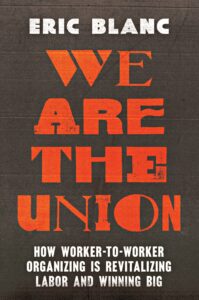
We Are the Union: How Worker to Worker Organizing Is Revitalizing Labor and Winning Big.
The bank robber Willie Sutton was asked why he robbed banks. He famously replied, “because that’s where the money is.” We’re interested in the labor movement not only for humanitarian reasons but because that’s where the power is. Union members can withhold their labor and bring the economy to a standstill.
Unionized workers gained ground in 2024. Union workers in the private sector saw a 6% rise in real wages last year. But overall, the working class has not had an increase in their real wages in 50 years. The cost of rent, groceries, health care and other basic needs are becoming more and more out of reach, even for those working full-time jobs.
As Donald Trump takes office on January 20th, many are preparing for a real threat to our standard of living and democratic rights. After all, his cabinet includes architects of the controversial Project 2025 initiative – the conservative blueprint that the American Federation of State, County and Municipal Employees calls, “a radical attack on working people and their unions.” How will the battle for workers’ rights unfold this year and beyond?
Guest – Professor Blanc teaches Labor Studies and Employment Relations at Rutgers University, and he’s an organizer trainer in the Emergency Workplace Organizing Committee. He’s the author of Red State Revolt: the Teachers’ Strike Wave and Working-Class Politics, and his research has appeared in the Nation, the Guardian and Jacobin, among other publications. His latest book is We Are the Union: How Worker-to-Worker Organizing is Revitalizing Labor and Winning Big. Laborpolitics.com
—-

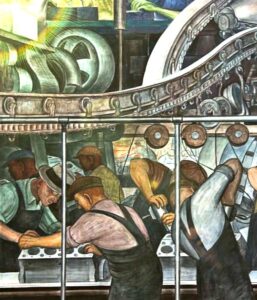
The Power Of Labor And A Workers’ Party
The forces of the gathering authoritarian storm in our country are evident in many ways. It is manifesting itself in powerful and continuing nationalism, in disdain for human rights, in the entwinement of government and religion, in a controlled mass media, in the protection of corporate power and the suppression of labor power and in the encouragement of violence.
The power of labor has been channeled into the Democratic and Republican Party, the twin parties of capitalism. We need a workers ‘ party, but we don’t even have the nucleus of one. Race and gender are formative in the building of authoritarian regimes. We see this in the United States. Haitians, who are Black, have been accused of eating cats and dogs. Women’s right to control their own bodies is under attack from the Supreme Court on down and women are marked as “childless cat ladies” and told to stay home and bear children.
Guest – Dianne Feeley is an editor of the magazine Against the Current. She is a leader of Solidarity, a socialist feminist organization. Dianne lives in Detroit where she has been an activist for many years in the United Automobile Workers union.

———————–
Civil Liberties, Civil Rights, Gaza, genocide, Human Rights, Targeting Muslims, U.S. Militarism, War Resister
Podcast: Play in new window | Download

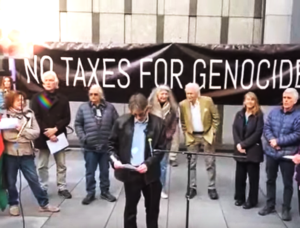
Taxpayers Against Genocide: Lawsuit Against Congress Members For Approving $26.38B In Military Aid To Israel
On December 19, 2024, a coalition of human rights activists and organizations filed a class action lawsuit against California Congress members Mike Thompson and Jared Huffman. The lawsuit alleges that the representatives misused their authority by approving $26.38 billion in military aid to Israel, despite evidence that these funds contribute to ongoing genocide against Palestinians in Gaza. Supported by more than 500 plaintiffs across Northern California, the case highlights growing public demands for accountability in U.S. foreign policy. It was filed by the group Taxpayers Against Genocide.
At the core of the lawsuit is the argument that Thompson and Huffman ignored clear evidence of war crimes committed with U.S.-provided weapons, effectively forcing their constituents into moral complicity. Plaintiffs describe profound emotional and moral injuries resulting from their representatives’ actions, emphasizing the ethical responsibility to prevent taxpayer dollars from funding human rights violations.
Sign up to the TAG mailing list: classactionagainstgenocide@proton.me
The lawsuit seeks declaratory and injunctive relief, aiming to halt military aid to Israel and secure accountability for decisions made in Congress. With plaintiffs ranging from seasoned activists to ordinary constituents, the case represents a significant legal challenge to U.S. military support for Israel amid increasing scrutiny over its devastating consequences for Palestinian civilians.
Guest – Seth Donnelly, a Sonoma County resident, former Bay Area high school teacher, human rights advocate, and one of the founders of Taxpayers Against Genocide.
Guest – Maria Barakat, a Lebanese Palestinian antiwar activist, sociologist of law and society, and public policy expert specializing in equity from UC Berkeley. Both Seth and Maria are plaintiffs in the lawsuit.
—-

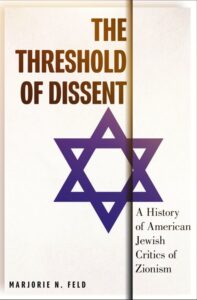
Judges Who Issued ICC Arrest Warrants Against Netanyahu Accused Of Being Anti-Semitic
On November 1, when the International Criminal Court issued arrest warrants against Israeli Prime Minister Benjamin Netanyahu and his former Defense Minister Yoav Gallant for war crimes and crimes against humanity, Netanyhu accused the judges of “anti-Semitic hatred toward Israel.”
When Donald Trump vowed to crack down on campus protests by invoking the Insurrection Act to enlist the US military, he warned American colleges and universities that if they do not “end antisemitic propaganda,” they would lose accreditation and federal financial support.
Today, one of the oldest and most virulent forms of hatred – antisemitism – is being weaponized as a cudgel to silence opposition to Israel’s war against the Palestinians. If you criticize Israel, you are an “antisemite.” If you condemn Zionism, you are an “antisemite.” If an international court, with 125 member countries, dedicated to what Kofi Annan called “the cause of all humanity,” accuses Israel (and it is important to note, also Hamas military commander Mohammed Deif) of war crimes, the judges (from France, Benin, and Slovenia) are guilty of “antisemitism.”
The founders of Israel willingly took on a known risk when they established a Jewish state, choosing sacred religious symbols, the Star of David (Magen David) as the official state insignia on the nation’s flag, the menorah as the official state emblem, and Hebrew as the state’s official language. In 2018, the Knesset doubled down by passing a law designating Israel the “Nation-State of the Jewish people.” The chairman of the special legislative committee that drafted the law, described it as simply confirming “the founding principle on which the state was established,” that “everyone has human rights, but national rights in Israel belong only to the Jewish people.” The Adalah Legal Center for Arab Minority Rights in Israel said the law “contains key elements of apartheid.”
During the highly contested debate over Zionism in the nineteenth and early twentieth centuries, anti-Zionists and non-Zionists repeatedly warned that establishing a Jewish state would pose grave dangers not only to indigenous Arab inhabitants, but to Jews around the world. Today that complex history has been largely replaced by an official, sanitized version that doggedly erases the many Jewish voices that have sounded well-grounded alarms over the establishment of a militarized theocracy.
Guest – Professor Marjorie Feld is the author of a new, groundbreaking book, The Threshold of Dissent: A History of American Jewish Critics of Zionism. She is a professor of history at Babson College and the author of Nations Divided: American Jews and the Struggle Over Apartheid.

—————————————
Civil Rights, Human Rights, Supreme Court, Truth to Power
Podcast: Play in new window | Download

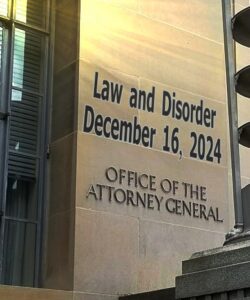
U.S. Attorney General Choice: Florida Attorney General Pam Bondi
Bondi, Florida’s first woman attorney general for eight years from 2011-2019, was part of Trump’s defense team during his first impeachment trial and supported his false claims of fraud following the 2020 election. She’s remained in Trump’s orbit since then, continuing to advise him on legal matters.
In announcing Bondi as his new choice, Trump signaled the role he expects her to play. “For too long, the partisan Department of Justice has been weaponized against me and other Republicans – Not anymore. … Pam will refocus the DOJ to its intended purpose of fighting Crime, and Making America Safe Again.”
By fighting crime, he means going after his political enemies. Bondi has loyally promised that “When Republicans take back the White House” and the Department of Justice, “the prosecutors will be prosecuted — the bad ones — the investigators will be investigated.”
Bondi is a partner at Ballard Partners, the lobbying firm that had been run by Trump’s incoming chief of staff Susie Wiles and whose founder, Brian Ballard, is a top Trump fundraiser. She is co-chair of the law and justice division at the pro-Trump America First Policy Institute. Thrust onto the national stage, Pam Bondi is not a household name. To learn more about her, we went to an award-winning journalist in her home state of Florida.
Guest – Scott Maxwell is a three-time-a-week columnist for the Orlando Sentinel. He joined the Sentinel newsroom as a reporter in 1998, and started writing his column in 2002. He has received awards from the Society of Professional Journalists, the Society of Newspaper Editors and others. Before coming to Orlando, Scott wrote for the Winston-Salem Journal and the Chapel Hill Herald, after graduating from the University of North Carolina at Chapel Hill’s School of Journalism.
—-
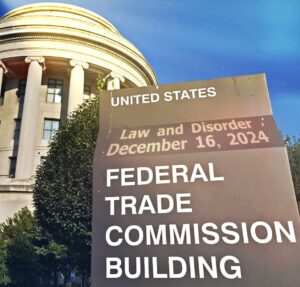

Next FTC Chairman: Business Friendly Approach Or Big Tech Anti-Trust Enforcement
President-elect Donald Trump last week named Andrew Ferguson as the next chair of the Federal Trade Commission. Ferguson is already one of the FTC’s five commissioners, currently consisting of 3 Democrats and 2 Republicans. Ferguson replaces FTC Chair Lina Khan, a vocal critic of Big Tech.
Antitrust laws are designed to promote fair competition by prohibiting monopolistic practices, unfair restraints on trade, and other behaviors that harm consumers or stifle innovation. The FTC plays a key role in enforcing these laws. It investigates businesses for anticompetitive practices, reviews mergers and acquisitions for potential harm to market competition and takes legal action to prevent or rectify violations.
With Trump’s recent nomination of Gail Slater as the Justice Department’s assistant attorney general for antitrust, some predicted that the incoming administration may continue Lina Khan’s tough stance on companies like Google and Apple. But many leading Republicans prefer a more business-friendly approach to antitrust enforcement that would avoid hampering Big Tech’s dealmaking and acquisitions.
Other top contenders for the FTC chairmanship were Melissa Holyoak, a Republican commissioner and former Utah solicitor general and Mark Meador, a former DOJ and FTC official who has served as an antitrust policy adviser to Sen. Mike Lee (R-Utah).
Guest – Laurel Kilgour from the American Economic Liberties Project in DC. Lauren leads the Project’s team of policy analysts and experts to produce research and policy briefs, with a focus on antitrust issues impacting economic liberties.

————————————–
Civil Rights, Human Rights, Human Trafficking, Immigration
Podcast: Play in new window | Download
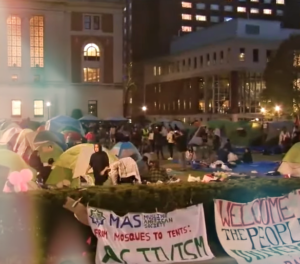

Attacking Those In Academia Who Condemn The Israel-Gaza War
All across this country, academic freedom is once again under severe attack. Why?…because at colleges and universities, professors who dare to speak out in defense of the Palestinian people and condemn Israel’s genocidal war against the Palestinian people, are being censored, disciplined and fired. These attacks on academic freedom are not limited to actions by university administrators, but include those by the federal government, as well. Visiting scholars, adjuncts and lecturers without tenure have also had their contracts terminated, or not renewed. Some had their classes suddenly cancelled. Faculty members who espouse views contrary to official U.S. policy vis-a-vis the Israeli/U.S. war in Palestine have been criticized in ways that have trampled on their reputations and hurt their careers. As an excuse for this present-day McCarthyism, college and university administrators often claim their censorious actions are undertaken only on behalf of ensuring their Jewish students feel “safe” on campus. But there is a distinct lack of evidence to support their claimed motivation. And, in fact, the largest pro-Palestinian actions on campuses are generally organized by Jewish groups, such as Jewish Voice for Peace.
So today we’ve invited a professor from the University of Michigan to join us. We’ll ask him about McCarthy-styled witch hunts against academic personnel, both in the past and again today. Learn how federal law is being misused as a mechanism of political repression against academia. And discuss the role that controversy over slogans condemning Zionism play in this new attack on academic freedom, and what strategies are best employed today by the anti-war movement in its fight back against these attacks, as the ever more deadly Israeli/U.S. war in Palestine continues.
Guest – Professor Alan Wald, the H. Chandler Davis Collegiate Professor Emeritus at the University of Michigan. Prof. Wald has authored eight books related to today’s topic. He has been a socialist scholar since the 1960’s, and is currently an editor of the journal Against the Current, as well as a member of the editorial board of Science and Society. And Prof. Wald was a founder of the University of Michigan’s Faculty and Staff for Justice in Palestine committee.
—-
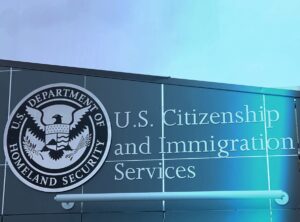
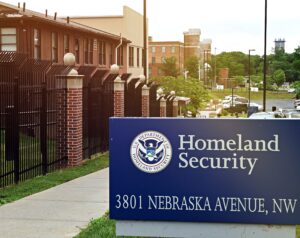
New Leadership Within The Department of Homeland Security
The Department of Homeland Security was created in 2002. Trump has nominated Kristi Neer, the Governor of South Dakota, to be its new head. The DHS has consolidated previous separate departments and brought into a single sprawling entity 22 pre-existing agencies. It became the nation’s third largest government department. Today it has a budget of over $100 billion and employs a quarter of a million people. Every danger is now conceived as a threat to homeland security.
As governor, Neer sent South Dakota National Guard troops to Texas eight times to fight what she called “the Biden border crisis”.
Trump said, “she will work closely with “Border Tsar” Tom Holman to secure the border and will guarantee that our American homeland is secure from our adversaries.”
Neer said, “I look forward to working with Border Tsar Tom Homan to make America safe again. With Donald Trump, we will secure the border, and restore safety to American communities, so that families will again have an opportunity to pursue the American dream”.
In 2017 she supported the Trump Muslim travel ban. In 2021 she opposed Afghan refugees coming into South Dakota.
In her memoir, she wrote about how she shot and killed her fourteen month old dog “Cricket” because he was not a good hunter.
Guest – Arun Kundnani, a Philadelphia based writer who moved from London to the U.S. in 2010. He has recently co-authored the pamphlet, Homeland Security: Myths and Monsters. His books include What is Anti-racism? And Why it Means Anti-capitalism, The Muslims Are Coming, and The End of Tolerance. A former editor of the journal Race and Class, Kundnani has been described by the Guardian newspaper as “one of Britain’s best political writers.“

—————————
Civil Liberties, Civil Rights, Gaza, genocide, Human Rights, Targeting Muslims, U.S. Militarism, Violations of U.S. and International Law, War Resister, worker's rights
Podcast: Play in new window | Download
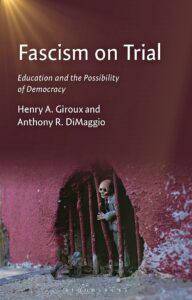

Fascism on Trial: Education, and the Possibility of Democracy
Fascist Germany’s industrial murder of Jews in Europe 80 years ago has been seared into the consciousness of humankind. Today its a great irony of history that the Israeli government, which claims to be the moral legatee of the holocaust, is carrying out a genocide against millions of Palestinians in Gaza.
This is being done with the full support of the American government which supplies political, diplomatic, and propaganda cover for what Israel is doing. It supplies the bombs, planes, artillery shells, tanks and bulldozers to physically destroy the buildings and infrastructure of the Gaza strip. The people who live there have been systematically starved, as the Nazis starved the Jews of the Warsaw ghetto.
The response of American students and college campuses across the country was magnificent. Tent encampments sprung up in several hundred places. They became the focal point for a full-throated discussion of the realities in Gaza and American complicity in the ongoing genocide. Demands for cease-fire were raised. Demands that the universities divest themselves of investments in Israel and American arms manufactures were put forward.
Sadly, this manifestation of critical thinking came to a crashing end. The wealthy and their servants in Congress, and in the mass media, accused the students of being antisemitic and of supporting terrorism. Congressional hearings were held. University presidents were fired. Professors lost their jobs. Students were expelled from schools. The great campus uprising was closed down. And new and much more restrictive rules for protest have been imposed in campuses all across the United States.
Guest – Professor Henry A. Giroux currently holds the McMaster University Chair for Scholarship in the Public Interest in the English and Cultural Studies department and is the Pablo Frère, Distinguished Scholar in Creative Pedagogy. Henry Giroux has authored many books, most recently with Anthony DiMaggio, titled, Fascism on Trial: Education, and the Possibility of Democracy.
Sending a another big thank you to a generous donor from Wisconsin bringing us closer to our fundraiser goal. Please consider helping us reach our fundraiser goal by sending us a donation of any amount.
—-
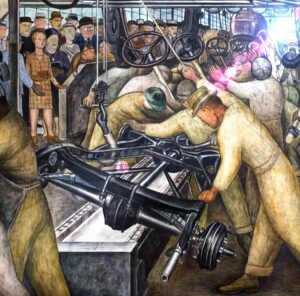
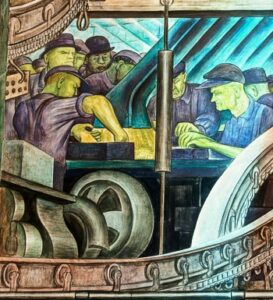
The Power Of Labor And A Workers’ Party
The forces of the gathering authoritarian storm in our country are evident in many ways. It is manifesting itself in powerful and continuing nationalism, in disdain for human rights, in the entwinement of government and religion, in a controlled mass media, in the protection of corporate power and the suppression of labor power and in the encouragement of violence.
The power of labor has been channeled into the Democratic and Republican Party, the twin parties of capitalism. We need a workers ‘ party, but we don’t even have the nucleus of one. Race and gender are formative in the building of authoritarian regimes. We see this in the United States. Haitians, who are Black, have been accused of eating cats and dogs. Women’s right to control their own bodies is under attack from the Supreme Court on down and women are marked as “childless cat ladies” and told to stay home and bear children.
Guest – Dianne Feeley is an editor of the magazine Against the Current. She is a leader of Solidarity, a socialist feminist organization. Dianne lives in Detroit where she has been an activist for many years in the United Automobile Workers union.

———————–
Civil Liberties, Civil Rights, Gaza, genocide, Human Rights, Immigration, Violations of U.S. and International Law, War Resister
Podcast: Play in new window | Download
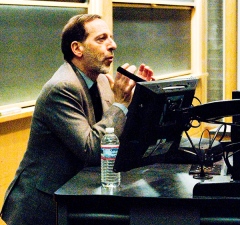

The Zionist’s Long Term Plan
The humanitarian catastrophe Israel has engineered, in Gaza has no precedent in the modern era, “ Patrick Lawrence recently wrote, in that “Israel hates the United Nations and all it stands for, international law above all, without limit.”
Last week using American airplanes and bombs, Israel illegally attacked Lebanon and then Syria. It is aiming to get the United States involved in a war against Iran.
Israel’s action in overwhelming, displacing, and murdering the native Palestinians was baked into the Zionists plan and carried out over the last hundred years. David Ben Gurion, called the father of modern Israel, said that “the Jewish people have a map… which our youth and adults should try to fulfill, from the Nile to the Euphrates… one needs an opportune moment for making it happen, such as a war”. The events of October 7 of last year were merely the pretext.
Ariel Sharon, Israeli general, Prime Minister, and statesman, was responsible for murdering Arabs in neighboring Lebanon. 17,000 civilians were killed in 1982 during the Israeli invasion of Lebanon. About 2000 were killed in the Sabra Sheila massacre by Phalangist allies of Israel and Sharon.
Sharon said, “I don’t mind if after the job is done, you put me in front of a Nuremberg trial and then jail me for life. Hang me if you like, as a war criminal. What you don’t understand is the dirty work of Zionism is not yet finished, far from it.”
We will now see more of the “the dirty work”, carried out with Trump promising to “finish the job.”
Guest – Columbia University Professor Rashid Khalidi is a Palestinian American historian of the Middle East, the Edward Said professor of Modern Arab Studies at Columbia University, and Director of the Middle East Institute of Columbia School of International and Public Affairs. He was educated at Yale and Oxford universities and is the author of many books on the Middle East. He is also the author of Under Siege: PLO Decision Making During the 1982 War, Brokers of Deceit: How the US Has Undermined Peace in the Middle East and recently The Hundred Years’ War on Palestine: A History of Settler Colonialism and Resistance, 1917–2017.
—
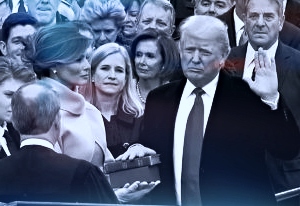

The Effects Of Donald Trump’s Reelection
The reelection of Donald Trump will have disastrous effects inside the United States and around the world. Today we examine two related crises, one at home and the other in the Middle East.
Israel’s ongoing assault on Gaza, according to Palestinian and international agencies has killed at least 43,020 people—most of them women and children. At least 101,110 others have been wounded and over 10,000 Gazans are missing and believed dead and buried beneath the rubble of hundreds of thousands of bombed homes and other structures. Millions more Palestinians have been forcibly displaced, starved, or sickened by Israel’s invasion and “complete siege” of Gaza.In October, senior members of Israeli Prime Minister Benjamin Netanyahu’s far-right Cabinet and national lawmakers spoke at a conference advocating the ethnic cleansing and recolonization of Gaza.
On October 28, the government of South Africa filed 750 pages of what it called “overwhelming” proof that Israel is committing genocide in Gaza to the International Court of Justice in The Hague, Netherlands. Under the court’s rules, the contents of the memorial cannot be made public at this time, but in a statement the office of South African President Cyril Ramaphosa, called the material a “comprehensive presentation of the overwhelming evidence of genocide in Gaza.”
In response to the genocide in Gaza, campus protests which roiled over 400 colleges and universities last year are heating up again but this time protesters face an incoming President who has promised to use the National Guard and even the US military to brutally suppress dissent, whether its in opposition to the renewed alliance between Trump and Benjamin Netanyahu or in response to Trump’s promise to launch mass deportations.
Trump and his allies have reportedly drafted plans for him to deploy the military against civil demonstrators on his first day in office, according to a Washington Post report from November 2023. Trump has also indicated that he will use the military to deport millions of undocumented immigrants.
When Fox News asked Trump whether he thought “outside agitators” might have an effect on Election Day, Trump responded by saying, “I think the bigger problem is the enemy from within.” He added, “We have some very bad people. We have some sick people, radical left lunatics. And I think they’re the big — and it should be very easily handled by, if necessary, by National Guard, or if really necessary, by the military, because they can’t let that happen.” We’re very fortunate to have a guest who is well-equipped to address both of these crises.
Guest – Marjorie Cohn is professor of law emerita at Thomas Jefferson School of Law and former president of the National Lawyers Guild. She is also Dean of the People’s Academy of International Law and a member of the Bureau of the International Association of Democratic Lawyers. She writes frequent articles about the Supreme Court for Truthout.

——————
























